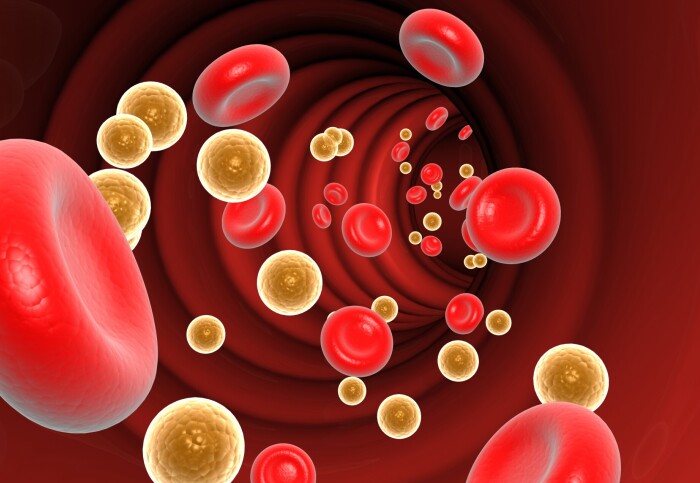Cholesterol guidelines and menstrual cycle insights: News from the College

Here’s a batch of fresh news and announcements from across Imperial.
From new analysis on combining multiple medications for cholesterol, to research into the mechanisms that control the menstrual cycle, here is some quick-read news from across the College.
Cholesterol guidelines

Combining multiple medications could help more than half of European patients achieve healthy cholesterol levels, finds new analysis.
Researchers reviewed guidance from the European Society of Cardiology (ESC)/European Atherosclerosis Society (EAS), which sets and outlines targets for attaining and maintaining healthy cholesterol levels.
Using data from over 2,000 patients from 18 European countries, they found more than half of high-risk patients could achieve 2019 ESC/EAS targets if they optimised their statin therapy and added an additional cholesterol-lowering drug, ezetimibe.
In patients already diagnosed with cardiovascular disease, a combination of statin therapy, ezetimibe and PCSK9 inhibitors would lead to around 90% of patients achieving their targets.
First author of the study, Dr Julia Brandts, honorary research associate within the School of Public Health, said: “Our study shows that simply offering one solution to combat high cholesterol and heart disease is not enough.”
Read the full paper in The Lancet Regional Health – Europe.
Carbohydrate chemistry
 Dr Ben Schumann, Group Leader at Imperial's Department of Chemistry and the Francis Crick Institute, has won The Dextra Carbohydrate Chemistry Award from the Royal Society of Chemistry, for the development of chemical tools to study glycoproteins.
Dr Ben Schumann, Group Leader at Imperial's Department of Chemistry and the Francis Crick Institute, has won The Dextra Carbohydrate Chemistry Award from the Royal Society of Chemistry, for the development of chemical tools to study glycoproteins.
The Award is presented to a scientist in the early/mid stage of their career for their meritorious work in carbohydrate chemistry. This award recognises the contributions of scientists who have made significant advancements in the field and encourages continued research and development in this important area of science.
Dr Schumann and his team study sugar molecules called glycans, which cover every cell in the human body and are involved in processes that are essential for life. However, small changes in glycans can have a profound impact on metabolism or on mounting immune responses against pathogens.
The team develop chemical precision tools to investigate glycan biological processes, such as which molecular machines build and modify which glycans (GlycoTrackers); using glycans to tag cancer biomarkers; and uncovering the role of glycosylation, such as the recent discovery of the role of O-glycosylation in the evolutionary trajectory of SARS-CoV-2.
Dr Schumann said: “I am deeply humbled by receiving the Dextra Award, following so many great leaders in the field. This would not have been possible without my amazing team members, colleagues, and family!”
IEEE Award
 Professor Geoffrey Li, Chair in Wireless Systems in the Department of Electrical and Electronic Engineering, has been jointly awarded the 2024 Institute of Electrical and Electronics Engineers (IEEE) Eric Sumner Award - one of the most prestigious awards in communication science.
Professor Geoffrey Li, Chair in Wireless Systems in the Department of Electrical and Electronic Engineering, has been jointly awarded the 2024 Institute of Electrical and Electronics Engineers (IEEE) Eric Sumner Award - one of the most prestigious awards in communication science.
Professor Li’s work includes orthogonal frequency division multiplexing (OFDM), a modulation technique that is used in almost all devices requiring wireless communications, such as computers, smartphones, Digital Audio Broadcaster, and Digital Video Broadcaster.
The IEEE Awards Program pays tribute to technical professionals whose exceptional achievements and outstanding contributions have made a lasting impact on technology, society, and the engineering profession.
Professor Li said: “I am delighted to receive this award, alongside two other incredible scientists. I would like to thank Imperial for their support during my career.”
Menstrual cycle insights
 New research into the intricate mechanisms controlling the menstrual cycle could help identify new targets for fertility treatment.
New research into the intricate mechanisms controlling the menstrual cycle could help identify new targets for fertility treatment.
Female fertility is maintained by a complex network of hormones and receptors in the body and brain. But precisely how the brain senses these hormones and relays signals to the ovaries has remained elusive.
Now, an Imperial-led team has uncovered how oestrogen receptors in the brain influence nerve signals. Working with mouse models, they shine a light on how receptors in two regions of the hypothalamus, which control egg development and ovulation, stimulate nerve signals when they detect oestrogen circulating in the blood.
But they also identified how oestrogen influences production of another crucial protein in fertility, kisspeptin, by downregulating gene expression.
Dr Bryn Owen, from the Department of Metabolism, Digestion and Reproduction, who led the work, said: “Much more work is needed…my hope is that future discoveries will enable the development of new treatments for disorders of reproduction.”
Read the full findings in Nature Communications.
Main image credit: Shutterstock. Want to be kept up to date on news at Imperial? Sign up for our free quick-read daily e-newsletter, Imperial Today.
Want to be kept up to date on news at Imperial? Sign up for our free quick-read daily e-newsletter, Imperial Today.
Article text (excluding photos or graphics) © Imperial College London.
Photos and graphics subject to third party copyright used with permission or © Imperial College London.
Reporter
Bryony Ravate
Communications Division
Benjie Coleman
Department of Surgery & Cancer
Hayley Dunning
Communications Division